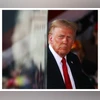By Sarah McBride
President-elect Donald Trump is handing out high-profile positions to some of the key Silicon Valley players who helped get him elected. At the top of the list, of course, is Elon Musk, with his starring role on the transition team. But there’s a larger coterie of tech world Trump supporters who are now working with the incoming administration, with varying degrees of formality.
The roles range from purely advisory to traditional appointments. For example, Musk’s “Department of Government Efficiency,” or DOGE, is an advisory group, not an actual US department. The investor Marc Andreessen is advising Trump, but is keeping his day job. And Palantir Technologies Inc. adviser Jacob Helberg is slated to take a more standard role as an undersecretary of state.
It’s still unclear how influential some of these roles will be. With advisory positions, “this is more an effort for Trump to signal a friendliness to innovation and investment in these sectors than anything else,” said Brian Broughman, a professor at Vanderbilt Law School who focuses on startups. And “also perhaps to repay the voices in Silicon Valley that helped to get Trump elected.”
But these technology industry leaders, even behind the scenes, will likely wield substantial power when Trump takes office.
Here, a cheat sheet on the techies working with Trump.
Also Read
Co-leader of DOGE: Elon Musk
Musk, one of Trump’s closest advisors, has a lot of jobs. He runs Tesla, SpaceX, Neuralink, the Boring Co., xAI and X. Since the election he’s also the key driver of DOGE, the government waste-cutting initiative he helms with one-time presidential candidate Vivek Ramaswamy. Musk is known for relentless, and sometimes chaotic, cost-cutting at his companies — and promises to bring the same zeal to the government. DOGE is still staffing up, with recruiting help from a key Musk deputy, but it’s unclear what the group’s actual responsibilities entail. It’s also temporary: DOGE is set to disband July 4, 2026, leaving Musk to his other six companies.
Artificial intelligence and crypto czar: David Sacks
Along with Musk, Sacks is a member of the so-called PayPal Mafia, a group of early leaders at the payments company who went on to have unusually illustrious careers. Sacks is now the head of Craft Ventures and co-host of the All-In technology podcast. The investor has advocated for less governmental involvement in the affairs of private companies, as well as limited regulation of AI and crypto. Despite his new czardom, Sacks’ spokesperson said the job is an only advisory role and he won’t leave Craft.
Adviser: Marc Andreessen
In run-up to the election, the co-founder of Andreessen Horowitz was one of the Valley’s most prominent Trump supporters. Last week, the billionaire told journalist Bari Weiss that since Election Day, he has spent half his time at Mar-a-Lago, providing advice to Trump— though he doesn’t hold a formal role with the transition team. Like many in Silicon Valley, Andreessen favors a more permissive environment for mergers and acquisitions and less regulation of cryptocurrency.
Head of the Justice Department’s civil rights division: Harmeet Dhillon
Trump has tapped Dhillon, a San Francisco lawyer and former vice chair of the California Republican party, for a key role in the Justice Department — a full-time government position. Dhillon, who attended a Trump fundraiser held by Sacks over the summer, has criticized Ivy League universities for failing to protect Jewish students, lampooned mask mandates, and filed lawsuits over stay-at-home orders during the coronavirus pandemic. She also represented an Alphabet Inc. employee who was fired after writing a memo criticizing the company’s diversity efforts.
Undersecretary of state for economic growth, energy and the environment : Jacob Helberg
Helberg will take a job in the State Department guiding international economic policy, according to a Trump post on Truth Social. Helberg is an adviser to the CEO of defense contractor Palantir, and founder of an advocacy group for China hawks in politics and tech called the Hill and Valley Forum. Helberg, who raised money for the Trump campaign along with his husband investor Keith Rabois, has supported efforts to ban TikTok in the US unless its parent company sells it.
All of Trump’s new tech advisers, whether part-time or full, will also wield power simply by having the ear of the president. The ascent of so many tech denizens into government roles signals a shift from how things were run in the Biden administration, and could have major implications for policy on areas like AI safety, crypto, taxes and regulation.
For some, that’s reason to celebrate. Others will be more wary, says Silicon Valley historian Margaret O’Mara. “It’s not a really fantastic development for those concerned about Silicon Valley power players having too much control,” she said.

)